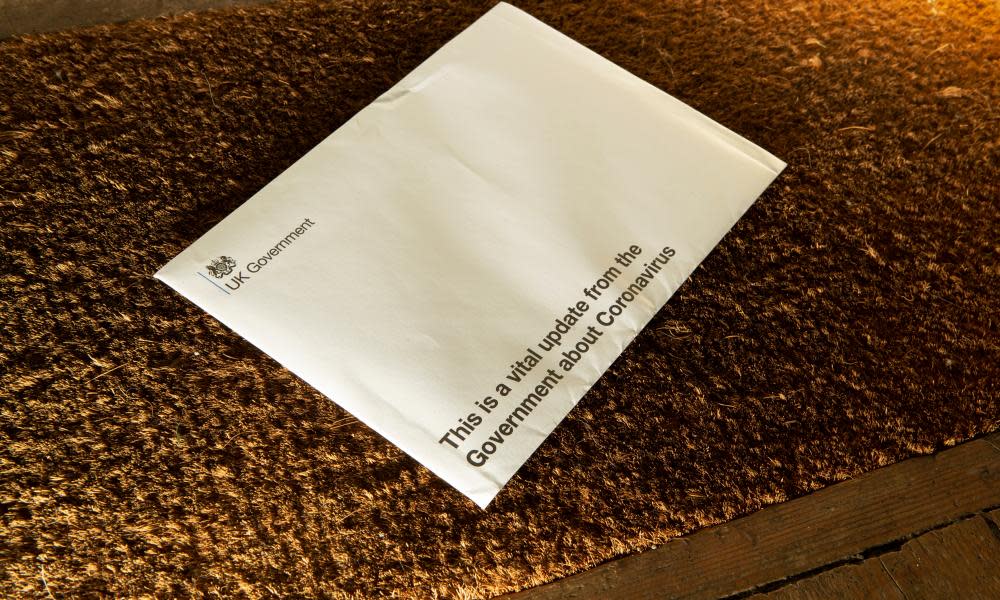UK government 'giving incorrect information on self-isolation', say GPs

People across the UK are being given incorrect information from the government about whether or not to isolate, with some wrongly instructed to remain indoors for 12 weeks, GPs have warned.
Doctors fear out-of-date information is being used as they are getting an increasing number of calls from people who do not understand why they have received a text or letter saying they are in the most at risk group. At the same time, some of those who are in priority groups are complaining they have been given no information, they said.
The list of who to contact, which would normally take weeks to do, was compiled in 48 hours, and given the huge undertaking errors are likely to have crept in.
Last month, the government announced it would contact 1.5 million people by 29 March to tell them that they should be “shielding”, which means they are most at risk to the virus and should stay indoors for 12 weeks.
Related: UK could have Europe's worst coronavirus death rate, says adviser
Dr Francesca Silman, a London GP, said: “Unfortunately a number of people I know did not receive letters despite fitting in the shielding category, some only received letters in the past few days, and others have received letters even though they don’t actually need to shield.”
She added: “It is all a bit of a mess. Part of the problem was I think originally NHS England thought the GPs could do some of the searches – but this is not at all an easy task and the guidance for GPs to go ahead was retracted … Meanwhile, I think the public are unaware of this issue and likely to be following the letters they have or haven’t received unless they have been proactive themselves and looked up the guidance.”
Information provided to the Guardian from a GP in Teesside, north-east England, with a practice of 8,000 patients, found that of the 10 patients who had been recipients of an organ transplant, only six had received the letters and four had been missed. A significant number of other patients on chemotherapy, immunosuppressants, with blood cancers and other severe underlying health conditions had also been missed, they reported.
The shielded patient list is a specific subset of patients identified by the chief medical officer. To identify these patients NHS Digital took the groups identified and converted them into a set of clinical codes and searched for patients with these conditions in the routine and administrative data sets that they hold nationally. They also did a search for patients this week and added around 400,000 more the original list of 900,000 patients, using data automatically pulled from GP systems.
NHS Digital relies on the quality of data entry by thousands of NHS staff, and so there may be some errors in the data. The list was put together in 48 hours. Specialist doctors and GPs can also add to it.
The Royal College of GPs said if anyone thinks they should be shielded but has not been told, or identified when they do not meet the criteria, they should contact their family doctor or hospital specialist. People have also started to receive texts from the government saying that if they feel the message does not apply to them they can opt out of receiving texts.
Dr Hugh Reeve, a GP in Cumbria, said he had been fielding requests from people who were confused as to what they should be doing after receiving messages. “As a GP I am now totally confused as to who is getting these messages – those who self-identified and were told to shield and contact their GP or those who were identified by national trawl.”
Katie Newbury, 32, from London, received a message in error. She had her spleen removed eight years ago, which puts at her risk of bacterial infections. She said she believed she was on the high risk list but not the shielding list. However, despite this she got a text from the government telling her she should stay in for 12 weeks.
“I got a text and it was disconcerting as I have been going out of the house. I have been avoiding shops but I have been going for walks – just the thought of not being able to leave my house for 12 weeks is worrying.”
She said she called her GP to confirm whether the advice was accurate and they said she could still go out for walks. “It did make me worry as I was wondering if there was something more they had discovered about people without spleens than initially.”
“The doctor said they would check the guidance while on the phone and said it was all right and I could still go outside the house. I saw other people on social media had similar issues.”
The Royal College of GPs also said that the guidance for identifying which vulnerable patients become shielded is still unclear, and they are raising this issue with the governments and health leaders across the UK.
Prof Martin Marshall, the chair of the Royal College of GPs, said: “There is still some uncertainty over the guidance for identifying which vulnerable patients become shielded, and we are raising this with the governments and health leaders across the UK.”

 Yahoo News
Yahoo News 
